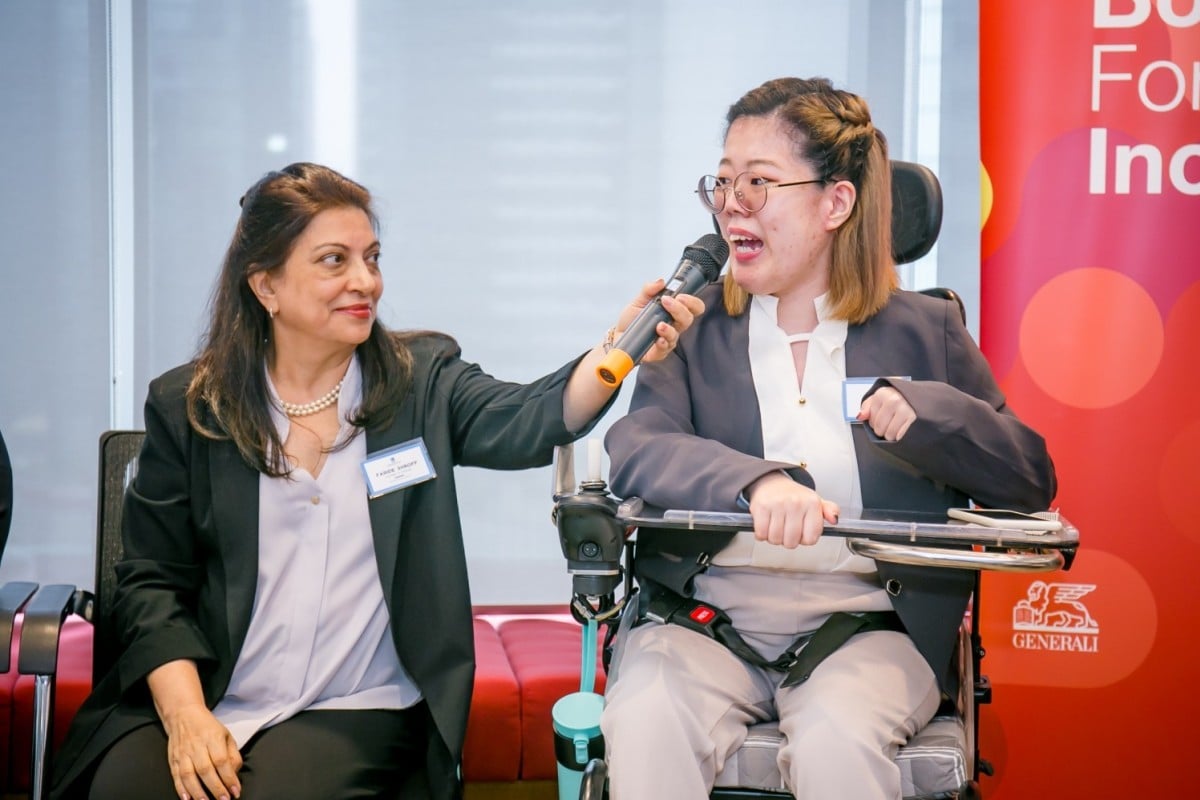
How SENsational Foundation is breaking down barriers for disabled people in Hong Kong’s schools and workplaces
- NGO, founded by Faride Shroff, educates the public about accessibility and inclusivity while providing counselling and other services for those with disabilities
- Every week, Talking Points gives you a worksheet to practise your reading comprehension with exercises about the story we’ve written
 Faride Shroff (left) aims to empower companies and individuals to create a more inclusive city. Photo: Handout
Faride Shroff (left) aims to empower companies and individuals to create a more inclusive city. Photo: HandoutNavigating school and planning for a career can be daunting for most young Hongkongers. But those with disabilities face additional barriers that make these endeavours even more challenging.
That is what Faride Shroff is trying to address through SENsational Foundation, which she founded in 2013 after working for over two decades as a teacher for students with special educational needs.
The NGO educates the public about the issues that people with disabilities face, and it has served hundreds of clients through programmes for counselling, mentoring, life skills and self-advocacy.
Shroff, who moved to Hong Kong from India over 30 years ago, left teaching in 2013 after counselling a former student through a crisis. That year, she founded her organisation and its first employee was this ex-student, who has a disability.
By starting this NGO, Shroff hoped to close the gap between employers and jobseekers with disabilities: “Our initial plan was just to provide awareness training to companies, and it was all done pro bono because our whole purpose was just to raise awareness.”
“[Starting this organisation] I was nervous,” she admitted. “But I had a talk with myself saying ... I’ve taught children and I’ve done it well. So now, it’s just a different shift where I’ll be teaching adults.”
Inclusivity and empowerment
According to a 2021 government survey, 7.1 per cent of Hong Kong’s population is disabled. About 116,600 – or more than a fifth of those with physical disabilities – said they faced a lot of difficulty in everyday life.
SENsational empowers companies and individuals to create a more inclusive city, while assisting people with disabilities in finding employment opportunities.
Shroff noted that disabled children are often excluded from classrooms for their differences, by peers as well as teachers who may not have the training or resources to meet the pupil’s needs.
“Including children with disabilities in the class ... [and] playing together is so important,” she said. “[But] parents say: ‘My kid should not be seated next to someone with a disability.’”
Hong Kong Paralympic athlete calls for more education, support for disabled people
According to Maheen Haider, SENsational’s communications manager, it is best to fight this stigma with education, which can shift people’s perspectives.
“Disability becomes this big, scary thing because we perceive it as a big scary thing,” she said, adding that the lack of discussions on disabilities contributed to these stereotypes. “But ... they don’t necessarily equate to a person’s value.”
Even beyond the stigma they face, families of children with disabilities still face financial hurdles.
“Parents have to spend so much money, not only [on] the school fees but ... for example, for speech therapy, for occupational therapy,” Shroff said, explaining why SENsational offered financial aid for families and provided services free of charge.
Making Hong Kong more accessible
The challenges don’t stop after children with disabilities grow up: they still face barriers in society, from inaccessible infrastructure to companies that don’t want to hire them.
Shroff and Haider noted that many buildings in Hong Kong sacrifice accessibility for aesthetics. For example, there are not enough ramps for wheelchair users, and lifts often do not have auditory signals to help people with vision impairment.
“I would describe Hong Kong as sort of casually disabling,” Haider said, adding that the NGO is pushing the city to improve accessibility. “[People] don’t go out and be abruptly rude to your face ... But there’ll be subtle microaggressions people with disabilities face.”
Inclusive Cantonese opera shows provide access for disabled in Hong Kong
For many Hong Kong companies, Shroff noticed they would not want to “inconvenience” themselves by hiring people with disabilities.
“People don’t want risk,” Shroff said. “[They think:] ‘If I want to employ someone with a disability, there’s going to be accommodations, I’m going to have to challenge the way that we do things.’”
But she pushes them to change their perspectives: “The only way to create positive sustainable change in society is if you ... are willing to be inconvenienced.”
To test your understanding of this story, download our printable worksheet or answer the questions in the quiz below.
